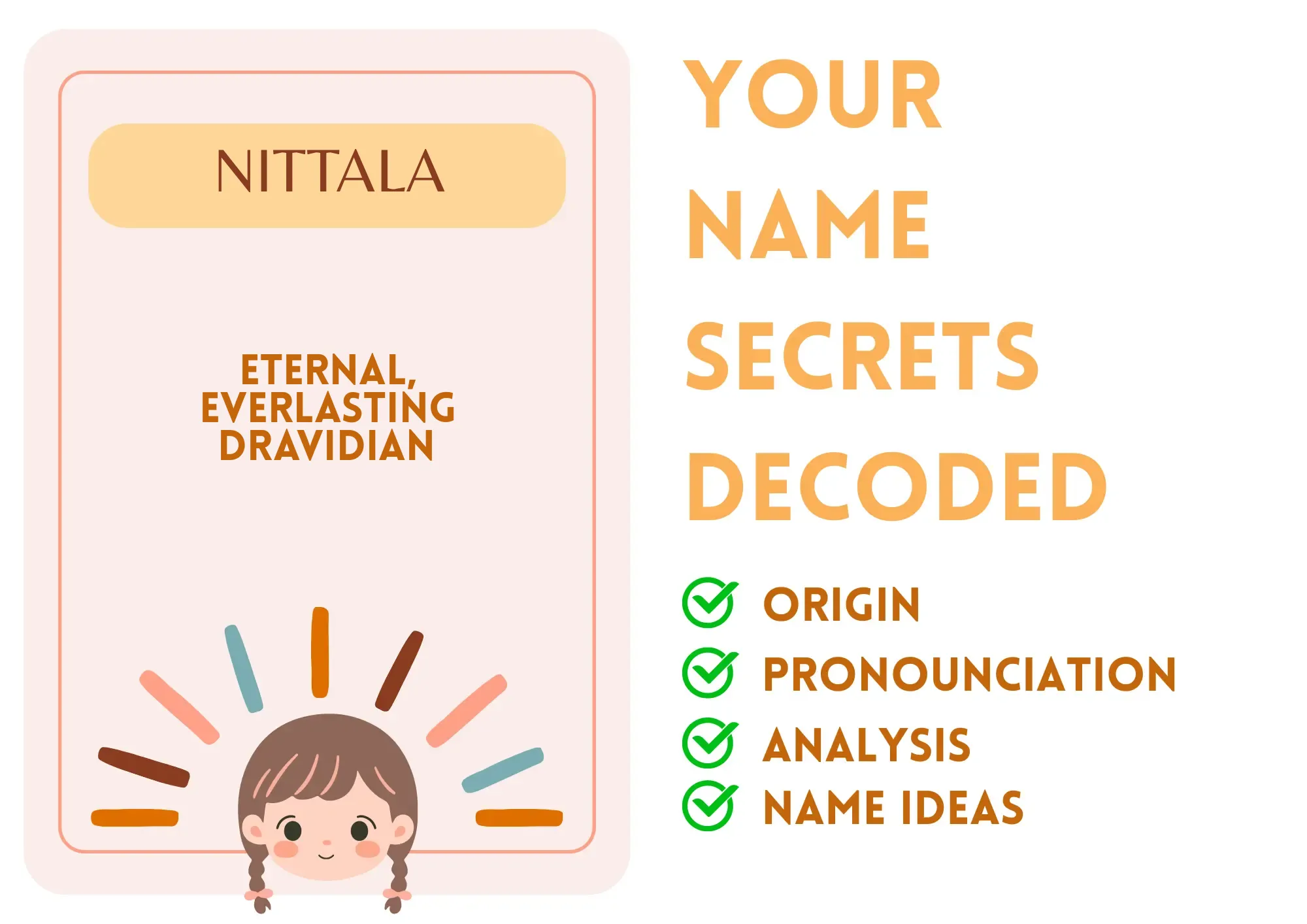
Nittala
Nittala is a unique name with a blend of cultural influences, potentially deriving from the Dravidian languages spoken in southern India. It has been interpreted to mean 'eternal' or 'everlasting', signifying a sense of permanence and continuity in life. Nittala is primarily used as a feminine name, although it could also be unisex in certain contexts.
The name Nittala embodies a sense of beauty and resilience, making it a cherished choice among parents seeking a meaningful name for their child. It resonates well with the themes of strength and enduring love.
Within cultural contexts, Nittala may not have extensive historical references but serves as a lovely modern choice reflecting contemporary naming trends. The name is positively perceived, evoking feelings of grace and simplicity.
Basic Information
Gender: Girl
Sounds Like: NEE-tah-lah
Pronunciation Explanation: The emphasis is on the first syllable 'NEE,' followed by a short 'tah' and 'lah'.
Summary and Meaning
Meaning: eternal, everlasting (Dravidian)
Origin: The name Nittala has Indian origins, specifically linked to Dravidian languages spoken predominantly in southern India.
Usage: Nittala is traditionally a feminine name, though it may also be considered unisex.
Name Number (Chaldean)
Name Number (Pythagorean)
Name Constellation (Nakshatra)
Name Zodiac Sign (Rashi)
Popularity (Global Rank)
Overall: 157402
Girls:
Most Popular in
Religious and Cultural Significance
Religion: Hindu
Background: Nittala reflects cultural aspects primarily among Hindu communities, where names often carry significant meanings.
Cultural Significance: It holds cultural value for those who appreciate names that signify continuity and resilience, aligning with spiritual beliefs related to life.
Historical Significance: Nittala does not have notable historical significance but embodies contemporary naming practices that focus on uniqueness and meaning.
Popular Culture
Literature and Mythology: Nittala itself is not widely recognized in traditional folklore or literature, but it fits within the context of modern storytelling and character development.
Movies and Television: There are no well-known characters named Nittala in mainstream movies or shows, making it a more original choice.
Feelings and Perceptions
Perception: Nittala is generally viewed favorably, seen as a beautiful and unique name with a serene quality. It elicits feelings of cultural richness and individuality.
Positive Feelings: Unique, graceful, serene, connected to culture.
Negative Feelings: As a less common name, it may be difficult for some to pronounce or remember.
Practical Considerations
Ease of Writing and Calling: Nittala is relatively straightforward to write and pronounce, consisting of seven letters and three syllables, which makes it memorable.
Common Typos and Misspellings: Nitala,Nittalaah,Nattala,Nitalla
Common Nicknames: Niti,Tala,Nina
Nittala Popularity
Nittala Usage and Popularity By Country
| Country | Rank (Overall) |
|---|---|
| India | 31224 |
| Germany | 81441 |
| United States | 539518 |
Nittala Usage and Popularity By City
| City | Rank (Overall) |
|---|---|
| HyderÄbÄd | 7108 |
| Kakinada | 2315 |
| Bengaluru | 34802 |
| Visakhapatnam | 6315 |
Compatibility Analysis
Famous Persons Named Nittala
No results found for Nittala.
Related Names
Similar Sounding Names:
Nita,Nilima,Nayana,Natala

